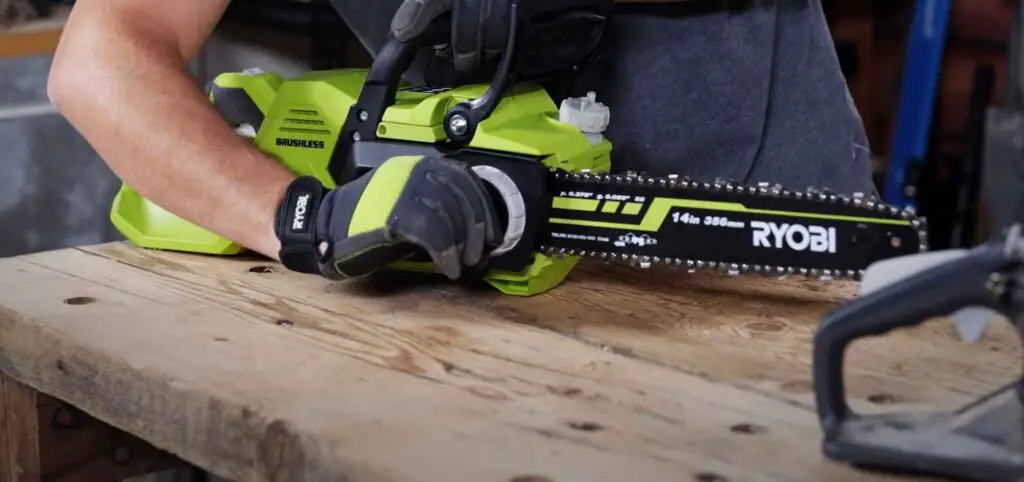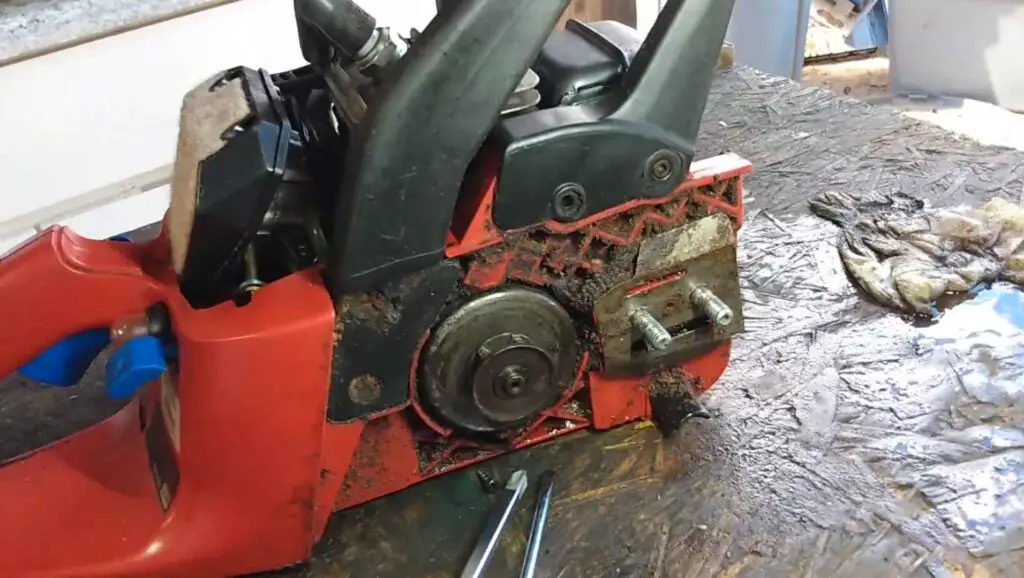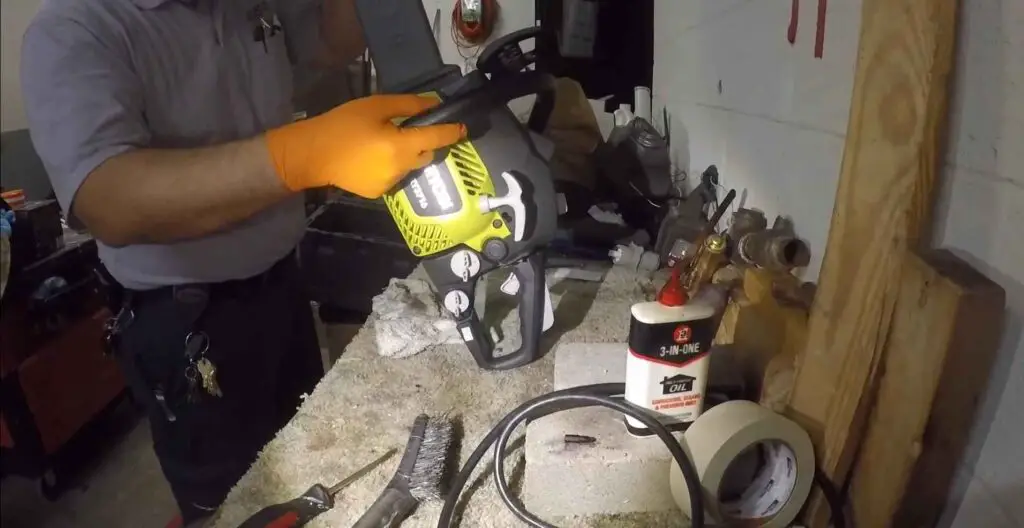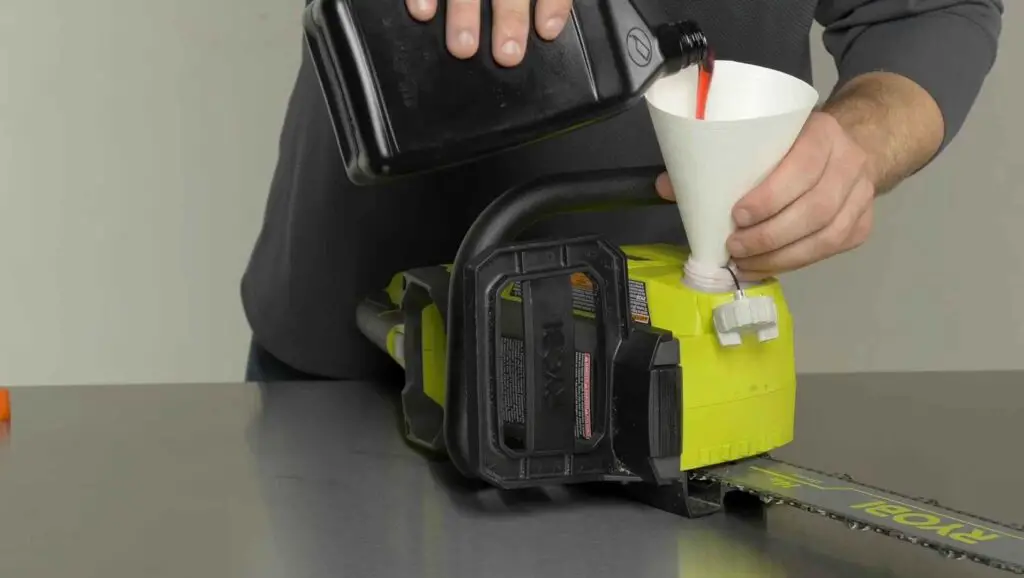Leaking oil from your ryobi chainsaw can be a frustrating problem. Not only does it create a mess, but it can also affect the performance and lifespan of the chainsaw. Fortunately, there are a few potential causes for this issue, and most of them can be easily resolved.
One reason your Ryobi chainsaw may be leaking oil is that the oil tank cap is not sealed correctly or tightened.
To fix this, check the cap and ensure it is secure. Another potential cause is if the oil pump or oil line is clogged or damaged. In this case, you may need to clean or replace these components to prevent further leakage.
Finally, excessive oil in the tank can also lead to leaks. Follow the manufacturer’s guidelines for oil-to-gas ratio and avoid overfilling the tank.
By addressing these potential causes, you can resolve the issue of your Ryobi chainsaw leaking oil and ensure it operates smoothly and efficiently.

Credit: www.reddit.com
Common Causes Of Ryobi Chainsaw Oil Leaks
Leaking oil is a common issue with ryobi chainsaws, and it’s essential to identify the root causes to prevent further damage and maintain the saw’s performance. This section will explore three common causes of ryobi chainsaw oil leaks: faulty oil cap, damaged oil line, and worn or defective oil pump.
Faulty Oil Cap
A faulty oil cap can lead to oil leakage in your ryobi chainsaw. Here are the key points to consider:
- Loose or improperly sealed oil cap can cause oil to leak out during operation.
- Damaged or worn-out oil cap gasket may result in oil seepage.
- Insufficient tightening of the oil cap can allow oil to escape through the cap.
Damaged Oil Line
A damaged oil line is another culprit for oil leaks in your ryobi chainsaw. Below are the main factors to be aware of:
- Cracked or brittle oil lines can cause oil to leak out.
- Loose connections or fittings along the oil line can result in oil leakage.
- Impact or accidental damage to the oil line can lead to oil seeping out.
Worn Or Defective Oil Pump
The oil pump is responsible for delivering oil to the necessary parts of the chainsaw. If it malfunctions, it can lead to oil leaks. Consider the following:
- A worn-out or damaged oil pump can cause oil to leak from various points.
- Faulty seals within the oil pump can result in oil leakage.
- Inadequate lubrication and increased friction from a defective oil pump can cause excessive oil leakage.
Remember to regularly inspect the oil cap, line, and pump to prevent leaks in your ryobi chainsaw. Promptly addressing any issues related to these components will help ensure your chainsaw’s efficient and trouble-free operation.
By understanding these common causes of ryobi chainsaw oil leaks, you’ll be better equipped to diagnose and resolve any oil leakage issues you may encounter. Regular maintenance, including checking and replacing worn-out parts, will help keep your chainsaw in optimal condition and minimize oil leakage.
Remember that addressing oil leaks promptly avoids potential damage to your chainsaw and ensures a safer and cleaner working environment. Taking care of your ryobi chainsaw will extend its lifespan and keep it running smoothly for years.
How To Identify An Oil Leak In Your Ryobi Chainsaw

If you own a ryobi chainsaw, it’s essential to watch for any signs of an oil leak. Not only can an oil leak affect the performance of your chainsaw, but it can also be hazardous and pose a risk while in use.
This section will explore three key indicators that can help you identify an oil leak in your Ryobi chainsaw. By being aware of these signs, you can take the necessary steps to address the issue promptly.
Visible Oil Stains
One of the most obvious signs of an oil leak is the presence of visible oil stains on your chainsaw. These stains can appear on the chainsaw’s body or on the surface where you typically place it during storage.
Look for dark, greasy spots or patches that indicate a leak. If you notice any visible oil stains, addressing the issue before using the chainsaw again is crucial. Here are a few reasons why your Ryobi chainsaw might have visible oil stains:
- Loose or damaged oil cap: If the oil cap on your chainsaw is not tightened correctly or damaged, it can lead to oil leaks.
- Damaged oil line: The oil line in your chainsaw can wear out or become damaged over time, resulting in oil leaks.
- Faulty oil pump: A malfunctioning oil pump can cause excessive oil to be pumped into the bar and chain area, leading to leaks.
By regularly inspecting your chainsaw for visible oil stains, you can catch any leaks early and address them promptly.
Pooling Of Oil
Another sign of an oil leak is oil pooling around your chainsaw. While you may not always notice visible stains, pooling oil is a clear indicator that there is a leak. Here are a few potential reasons why oil may be pooling around your Ryobi chainsaw:
- Damaged oil tank or cap: A crack or damage to the oil tank or cap can cause oil to leak and accumulate around the chainsaw.
- Clogged oil channels: Over time, the oil channels in your chainsaw can become clogged with debris, preventing proper oil flow and resulting in leaks.
- Worn-out oil seals: The oil seals in your chainsaw can wear out over time, leading to oil leaks and pooling.
If you spot oil pooling around your chainsaw, it’s crucial to address the issue promptly to prevent any further damage or safety hazards.
Excessive Oil Consumption
Apart from visible oil stains and pooling, excessive oil consumption can also indicate an oil leak in your Ryobi chainsaw. If you notice that your chainsaw is consuming an unusually high amount of oil, it could be a sign that there is a leak in the oil delivery system.
Here are a few reasons why your chainsaw might be experiencing excessive oil consumption:
- Loose or damaged oil lines: When oil lines are loose or damaged, they can result in oil leakage, causing the chainsaw to consume more oil than necessary.
- Faulty oil pump settings: If the oil pump settings are improperly calibrated, the chainsaw may dispense more oil than required, resulting in excessive consumption.
- Cracked oil reservoir: A cracked oil reservoir can lead to oil leaks and increased oil consumption.
Regularly monitoring the oil consumption of your ryobi chainsaw can help you identify any leaks and prevent further damage to the chainsaw.
Identifying an oil leak in your ryobi chainsaw is crucial for maintaining its performance and your safety. By keeping an eye out for visible oil stains, pooling of oil, and excessive oil consumption, you can promptly address any issues and ensure that your chainsaw operates optimally.
Remember, it’s essential to take immediate action when you spot any signs of an oil leak to prevent further damage to your ryobi chainsaw.
Step-By-Step Guide To Fixing Oil Leaks In Your Ryobi Chainsaw
Step 1: Check The Oil Cap
When it comes to fixing oil leaks in your ryobi chainsaw, the first step is to check the oil cap. Here’s how you can do it:
- Inspect the oil cap for any signs of damage or misalignment.
- If you notice any cracks or wear on the oil cap, it might be the cause of the oil leak.
- Ensure that the oil cap is tightly secured. If it feels loose, tighten it properly.
- If the oil cap is damaged beyond repair or unable to be properly aligned, replacing it with a new one is recommended.

Step 2: Inspect The Oil Line
The second step in fixing oil leaks is to inspect the oil line. Follow these steps:
- Look closely at the oil line for any visible cracks or signs of wear.
- Cracked or worn-out oil lines can result in oil leaks.
- If you find the oil line defective or damaged, it’s essential to replace it to prevent further leaks and ensure proper oil flow.
Step 3: Assess The Oil Pump
The third and final step to fixing oil leaks in your ryobi chainsaw is to assess the oil pump. Here’s what you need to do:
- Check the oil pump for proper functioning. Ensure that it is delivering the right amount of oil to the chain.
- If the oil pump is not functioning correctly or fails to provide adequate lubrication, it may lead to oil leaks.
- Replace the oil pump if needed to ensure the smooth operation of your chainsaw and prevent any oil leakage issues.
Remember, addressing oil leaks promptly will not only help maintain the performance and lifespan of your ryobi chainsaw but also prevent potential safety hazards. Make sure to follow these steps carefully and maintain your chainsaw regularly to keep it in optimal condition.
Tips For Preventing Oil Leaks In Your Ryobi Chainsaw
If you own a ryobi chainsaw, you may have encountered the issue of oil leaks. While it can be frustrating to deal with, there are steps you can take to prevent oil leaks in your ryobi chainsaw.
This section will discuss some tips for preventing oil leaks, including regular maintenance, proper oil-to-fuel mixture, and avoiding overfilling the oil reservoir.
Regular Maintenance
Regular maintenance is essential for keeping your ryobi chainsaw in good working condition and preventing oil leaks. Here are some important maintenance tasks you should perform:
- Clean the chainsaw thoroughly after each use to remove any debris or sawdust that may have accumulated.
- Inspect the oil tank and chain oiler regularly for any signs of damage or clogs.
- Check the oiler adjustment to ensure that it is properly lubricating the chain.
- Replace any worn or damaged parts, such as the oil pump or oil lines, as soon as they are identified.
- Keep the air filter clean and replace it when necessary to ensure proper airflow and prevent clogs.
Proper Oil-To-Fuel Mixture
The correct oil-to-fuel mixture is crucial for preventing leaks in your ryobi chainsaw. Follow these guidelines to ensure the right mixture:
- Refer to the user manual or manufacturer’s instructions for the recommended oil-to-fuel ratio for your specific chainsaw model.
- Use a measuring container designed to mix oil and fuel to ensure precise measurements.
- Mix the oil and fuel thoroughly before adding it to the chainsaw’s fuel tank.
- Avoid excessive oil in the mixture, as this can lead to oil leaks and engine damage.
- Use only high-quality, recommended two-stroke oil for the best results.
Avoid Overfilling The Oil Reservoir
Overfilling the oil reservoir can commonly cause oil leaks in ryobi chainsaws. To prevent this issue, keep the following points in mind:
- Fill the oil reservoir according to the manufacturer’s recommendations and avoid adding more oil than necessary.
- Monitor the oil level before and during use to ensure it remains within the specified range.
- Do not top up the oil reservoir if it is already filled to the recommended level.
- If the oil level decreases rapidly, check for leaks or other potential issues that may require attention.
These preventive measures can significantly reduce the chances of oil leaks in your ryobi chainsaw. You can keep your chainsaw running smoothly and prolong its lifespan by performing regular maintenance, using the correct oil-to-fuel mixture, and avoiding overfilling the oil reservoir.
Remember to consult the user manual or seek professional assistance if you encounter persistent oil leak problems.
Frequently Asked Questions About Ryobi Chainsaw Oil Leaks

Ryobi Chainsaw Leaking Oil
Are you having trouble with your Ryobi chainsaw leaking oil? Don’t worry, you’re not alone. Many chainsaw owners have experienced this issue, and we’re here to help. In this section, we’ll answer some frequently asked questions about ryobi chainsaw oil leaks, providing you with the information you need to address this problem effectively.
Q1: How Often Should I Check For Oil Leaks In My Ryobi Chainsaw?
It’s important to regularly inspect your ryobi chainsaw for any signs of oil leaks. By doing so, you can identify and address the issue before it becomes more severe. We recommend checking for oil leaks in your ryobi chainsaw at least once a month.
This will help maintain its optimum performance and prevent any potential damage caused by excessive oil leakage.
Here are some key points to keep in mind:
- Inspect the chainsaw for any visible oil leaks, paying attention to the oil tank, chain bar, and chain tensioner area.
- Look for oil accumulation or pooling underneath the chainsaw while in use or at rest.
- Check the oil tank cap to ensure it is tightly secured to prevent oil from leaking out.
- If you notice any oil leaks, contact ryobi customer support or take your chainsaw to an authorized service center for further inspection and repair.
Q2: Can I Use Any Oil In My Ryobi Chainsaw?
To maintain optimal performance, it’s essential to use the recommended oil for your ryobi chainsaw. Using the wrong type of oil can lead to issues such as excessive smoking, decreased lubrication, and even damage to the engine.
Consider the following points:
- Ryobi chainsaws typically require a specific bar and chain oil type for lubrication.
- It is important to use oil specifically designed for chainsaws to ensure proper lubrication and enhance the lifespan of your chainsaw.
- Using alternative oils, such as motor or vegetable oils, may result in subpar performance and potentially damage the chainsaw.
- Always refer to the manufacturer’s instructions or consult the product manual to determine the appropriate oil type for your ryobi chainsaw.
Q3: Is It Normal For A Chainsaw To Leak A Small Amount Of Oil?
While it is common for chainsaws to experience some oil leakage, it should be minimal and not affect the overall performance of the chainsaw. Here are a few key points to keep in mind regarding oil leakage:
- A small amount of oil leakage is generally considered normal and often results from the automatic oiler system within the chainsaw.
- The automatic oiler is responsible for lubricating the chain during operation, and a small oil leak may occur as a result of the system working properly.
- However, excessive oil leakage or pooling should be investigated further, as it may indicate an issue with the chainsaw’s oiling system or a faulty part.
If you believe the oil leakage in your ryobi chainsaw is excessive or impacting its performance, we recommend contacting ryobi customer support or taking it to an authorized service center for assistance.
Remember, regular maintenance and care are crucial for the longevity and efficient operation of your ryobi chainsaw. By understanding and addressing oil leaks promptly, you can keep your chainsaw running smoothly for years to come.
Why Is My Ryobi Chainsaw Leaking Oil?
If your ryobi chainsaw leaks oil, it could be due to a few reasons. First, check if the oil cap is securely fastened. If it is, the most likely cause is a damaged oil tank or a broken pump.
These issues require professional repair or replacement to prevent further leaks.
How Can I Fix A Leaking Oil Tank On My Ryobi Chainsaw?
Fixing a leaking oil tank on a ryobi chainsaw requires replacing the damaged tank. Start by disconnecting the spark plug and emptying any remaining oil from the tank. Next, remove and replace the old tank with a new one, ensuring all connections are secure.
Finally, refill the tank with the correct oil amount and test for leaks.
What Causes The Oil Pump On My Ryobi Chainsaw To Leak?
A leaking oil pump on a ryobi chainsaw can be caused by a few factors. The most common is wear and tear on the internal components, such as the seals and gaskets. Additionally, using low-quality or incorrect oil can also affect the pump’s performance and lead to leaks.
To fix this issue, it is best to seek professional assistance in repairing or replacing the oil pump.
Conclusion
To summarize, if you have been experiencing oil leakage issues with your ryobi chainsaw, don’t panic. Several common causes for this problem include loose caps, damaged seals, or using the wrong type of oil. By taking a systematic approach and troubleshooting each element, you can quickly identify and rectify the source of the leak.
Inspect and clean your chainsaw regularly to prevent accumulations and ensure optimal performance. Regular maintenance, such as checking oil levels and keeping the chain adequately tensioned, will minimize the risk of future leaks.
By following these simple steps and understanding the root causes of oil leakage, you can continue to enjoy the efficient and reliable performance of your ryobi chainsaw for years to come.